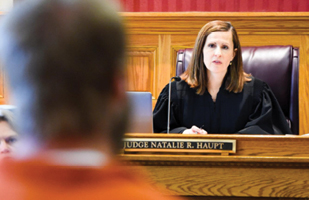Domestic Violence Courts Contend with Social Distancing Challenges

Stark County Common Pleas Judge Natalie Haupt oversees one of Ohio’s five specialized dockets that focuses on rehabilitating domestic violence offenders with substance use and mental health issues. (Credit: Canton Repository)

Stark County Common Pleas Judge Natalie Haupt oversees one of Ohio’s five specialized dockets that focuses on rehabilitating domestic violence offenders with substance use and mental health issues. (Credit: Canton Repository)
As a focus of one of Ohio’s most specific specialized dockets, 2020 has been especially difficult for specialty courts dealing with intimate partner violence as well as offenders, who often struggle with substance use and mental health issues.
Judges, court staff, and treatment providers with deal with convicted abusers address more than just their behavior.
“You’re treating the whole person and trying to get to the root cause of what’s going on, the way they’re thinking, and the power and control that comes along with the battering and other things in their lives,” said Alison Jacob, Stark County Common Pleas’ program coordinator.
As one of four domestic violence courts certified by the Ohio Supreme Court’s Specialized Docket Section – along with Summit County Common Pleas Court, and Akron and Mansfield municipal courts – the Stark County court has found the COVID-19 pandemic has made it more difficult to facilitate the changes needed to alter the behavior of program participants.
Since March, Stark County’s program has ceased group meetings at the courthouse – which can range from 20-35 people – to limit coronavirus spread. That adjustment has been trying for these individuals, who need more structure and accountability from the court to evolve, and those who can be influenced by others discussing and exhibiting their progress through the three-phase system.
“They're the best advocates for the program and treatment,” said Judge Natalie Haupt. “That's why I can't wait for us to get back to our full groups because they're the best teachers. They can see their behavior and identify it.”
As a way to fill the void of in-person judicial accountability and communal support, the court has leaned on technology and its day reporting program, which is a probationary staple for those who need daily or regular supervision.
During these routine sessions – offered both in person and virtually through the court and its community partners – offenders have specific needs addressed and services tailored to their rehabilitative programming. These include batterer intervention, victim awareness, relapse prevention, drug screening, employment services, and educational opportunities. Day reporting is also one of the rare opportunities where participants still can be in the same room with groupings limited to three or four people in adherence to social distancing guidelines.
“There are those who've surprised us throughout the program. Especially now, I try to be more encouraging and focus on the positives because I know that we're asking a lot of them, and that it can seem overwhelming,” Judge Haupt said.
On top of utilizing more electronic monitoring devices, staff members and probation officers are utilizing the latest court innovations amid physical separation.
Virtual case management systems help court officers get real-time visuals of offenders they’re tracking and their surroundings through smartphones.
The most vital tech implementation has been videoconferencing, which maintains the continuity and norms of the weekly docket. It’s there where individuals collectively experience the setbacks of sanctions, and the praise and tokens – such as gift cards – awarded to those making good decisions.
Since its inception, the specialty court, which requires a minimum of one year to complete, has 136 graduates. It also boasts success rates higher than averages recorded by the National Drug Court Institute for both the number of entrants who successfully complete the program – 66% versus 59% -- and a three-year recidivism rate – 14% compared to 11%.
At the center of domestic violence cases is the issue of control, and how abusers use violence as their means of control. Judge Haupt’s program, which began in 2014 and only accepts men in intimate partner relationships, stresses the significance of accepting the equality of men and women.
“We have a female judge. We have a female coordinator. [Participants] see women who have roles higher in the hierarchy of things, and they see that [women] are treated fairly,” Jacob said.


